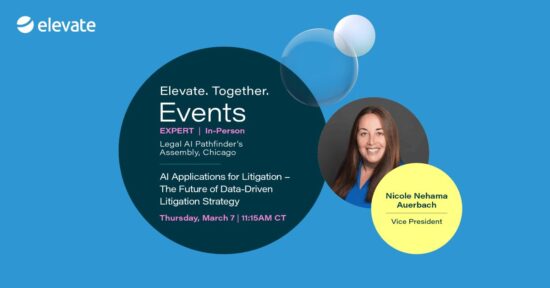The Strategic AI Portfolio: Beyond the GenAI Excitement
April 17, 2024
contracts Consulting discovery trends software elm law department consulting legal operations CLOC law department artificial intelligence
Perhaps no topic is more ‘top of mind’ for legal ops professionals – and their law department colleagues – than Artificial Intelligence (AI). The critical challenge around AI’s use in legal is cognitive, not technological: understanding how to think about, assess, and deploy AI strategically.
Despite the hype (some of it justified) concerning the capabilities and potential of LLM-powered Generative AI (GenAI) to transform legal operations, GenAI isn’t a panacea for all things legal or legal ops. To best leverage AI, you need to see past the hype and focus on not just what AI (and not merely GenAI) can do but what it does well. You must also familiarise yourself with the capabilities and limitations of the growing number of AI-powered tools for legal. Only then can you determine the overlap between your existing and emerging needs and what AI can (and soon will be able to) do beyond GenAI alone.
The Varied Landscape of AI in Legal
AI technologies in the legal field span a broad spectrum, from machine learning algorithms designed to predict legal outcomes to natural language processing (NLP) systems that support document analysis and contract review. Each of these technologies offers unique advantages for specific legal functions, for example:
- Document Review and Management: Machine learning’s ability to identify patterns in data is transforming document review by automating and optimising the classification and sorting of immense volumes of legal documents. ML’s impact is enhanced with rule-based AI whereby humans set specific parameters to organise content efficiently. Another ‘force multiplier’ is NLP’s ability to distil and summarise dense information. Deep learning adds a layer of finesse by interpreting subtleties, markedly improving the precision and speed of legal document management.
- Predictive Analytics: Predictive analytics transforms historical data into a goldmine for machine learning algorithms to forecast case outcomes that inform strategic legal planning. Rules-based AI supplements this by applying legal principles to enhance the prediction process. NLP goes a step further to pull out relevant facts, and deep learning cuts through the noise to identify underlying patterns, all contributing to smarter, evidence-based decisions in law.
- Contract Analysis and Automation: The nuanced field of contract analysis benefits immensely from machine learning’s ability to quickly pinpoint and pull out critical elements. Rules-based AI strengthens compliance by performing checks against established standards. NLP provides clarity in understanding contracts and facilitates automated routine drafting tasks. Deep learning’s capability to grasp complex contractual language and patterns means that even the most intricate clauses don’t escape scrutiny. All of this leads to more efficient contract management.
- Chatbots and Legal Assistants: The responsiveness of chatbots is exponentially improved by machine learning, learning on the go to provide tailored advice. Rules-based AI ensures that the chatbots’ guidance remains within proper legal boundaries. NLP enables these virtual assistants to interpret and respond to complex inquiries in a conversational manner. Deep learning takes this a step further by enabling a sophisticated understanding of context and nuance, ensuring that users receive assistance that’s not just fast but also accurate and contextually relevant.
The Role of GenAI
GenAI, powered by LLMs, is revolutionising the legal industry with its capacity for processing and understanding complex information. It can support the creation of legal documents and clauses, crafting detailed responses, and extracting insights from immense legal datasets. These language models leverage vast amounts of data to generate and contextualise relevant content, significantly easing the workload in law departments. However, GenAI’s broad approach can occasionally fall short in highly specialised tasks. For instance, the work of contract analysis or the precision needed for predictive case outcome analytics might require AI solutions focused on those specific use cases. Nevertheless, GenAI and LLMs offer a robust toolset for handling a wide array of legal tasks, striking a balance between general proficiency and specialised expertise.
Building a Strategic AI Portfolio
While the excitement around GenAI is undoubtedly palpable, my Elevate colleagues and I advise a more nuanced approach under which law departments prioritise the strategic integration of various AI tools. Remember, AI is not simply about a single transformative tool but rather fostering an ecosystem in which each technology complements the others, exponentially enhancing the collective capability of legal operations. Existing AI solutions have already demonstrated the substantial advantages of adopting a portfolio approach. Continuing this journey means identifying opportunities to integrate GenAI into the existing framework, where it fits naturally and adds value. Many law departments have made significant investments in AI over recent years; it would be counterproductive to sideline these resources. The goal should be to enhance, not replace—to intelligently find and implement the right tools for the right tasks, ensuring that investment in AI continues to yield dividends in efficiency, accuracy, and innovation.
The essence of building a strategic AI portfolio lies in matching the tool to the task. Here are steps law departments can take to leverage AI effectively:
- Assess Specific Needs: Understand the unique challenges and requirements of your legal operations to identify where AI can have the most impact.
- Diversify AI Investments: Invest in a range of AI technologies, ensuring a mix of specialised tools and broader solutions like GenAI to cover various needs.
- Integrate and Connect: Ensure that AI tools can work together seamlessly, sharing data and insights to create a cohesive technology ecosystem.
- Stay Informed and Flexible: The AI landscape is continuously and rapidly evolving. Staying informed about the latest developments and being willing to adjust your AI portfolio as needed is crucial for maintaining an edge.
In the context of legal technology, diversity is a strength. While GenAI presents a ground-breaking tool with wide-ranging applications, it’s not a one-size-fits-all solution. A strategic portfolio of AI tools, carefully selected to meet a law department’s or law firm’s specific needs, will unlock the full potential of AI in legal operations. By leveraging the right tool for the right job, legal professionals achieve unprecedented enhancements in efficiency, accuracy, and service quality.
The CLOC Global Institute in Las Vegas presents an invaluable opportunity to thoroughly explore AI’s role in legal operations. Join us to exchange ideas on the strategic deployment of AI tools within the legal sector. The event is an opportunity to share insights and leverage the collective expertise of professionals at the forefront of legal technology. We look forward to hearing your perspectives at CLOC!
Back to Expertise

 Rob MacAdam
Rob MacAdam





